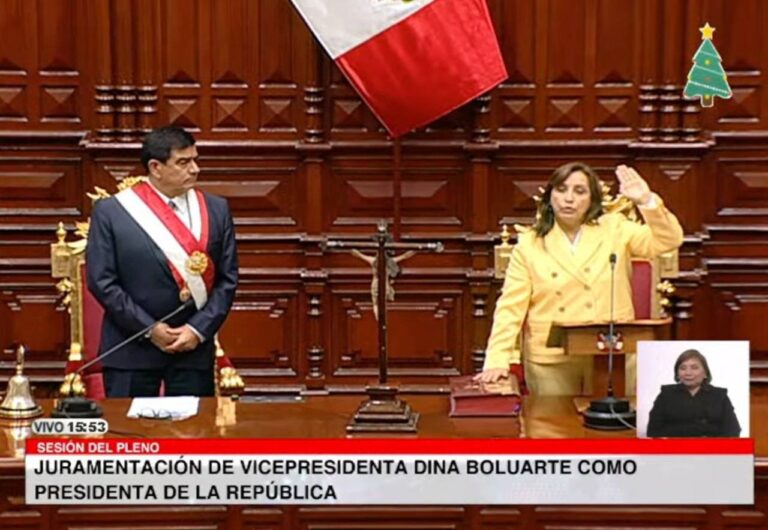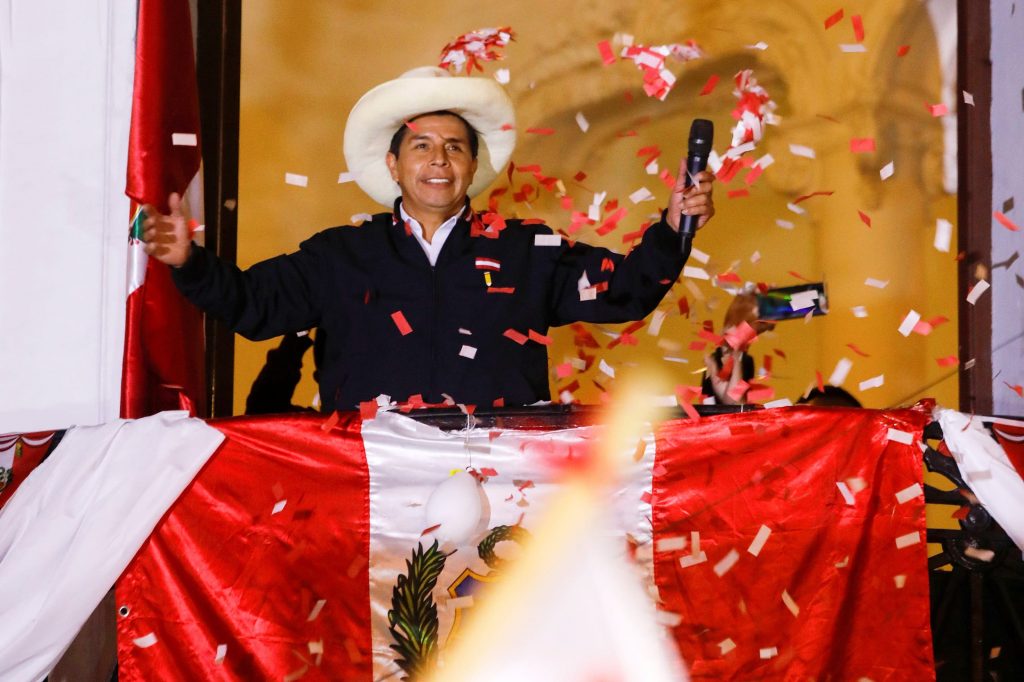The Peruvian President Pedro Castillo arrested for ‘breaching constitutional order’ after alleged coup attempt.
Pedro Castillo, has been removed from office and detained on charges of rebellion after he announced he would shutter congress and install a “government of exception” – just hours before he was due to face an impeachment vote. The public prosecutor’s office confirmed that Castillo had been arrested and charged with allegedly “breaching constitutional order”, after he was accused of an attempted coup and seen fleeing the presidential palace.
Castillo ordered a night-time curfew and the reorganisation of the judiciary and prosecutor’s office, which is investigating him for alleged corruption and influence trafficking, leading a criminal organization with lawmakers and family members to profit off government contracts and repeatedly obstructing justice.
In a televised speech, Castillo said he would temporarily shut down congress, launch a “government of exception” to rule by decree and called for new legislative elections.
His decision was triggered by an impeachment vote planned against the president on corruption charges. The impeachment attempt came amid escalating tensions between the two government branches.
On June 28, 2022, Peru Libre’s (Castillo’s party) National Executive Committee issued a statement requesting Mr. Castillo’s resignation, arguing, among other things, that the policies undertaken by his government are not consistent with what was promised in the electoral campaign. They claimed that Mr. Castillo has implemented a looser neoliberal program and announced that Peru Libre party will continue to fight for the conquest of its legitimate aspirations. The leaders of Peru Libre blamed Castillo for having promoted the internal fracture of his caucus, which went from having 37 members in July 2021 to just 16 in July of 2022. In May of this year, 10 congressmen from Peru Libre resigned from the party. All outgoing members belong to a group of professors who were invited by Pedro Castillo to join Peru Libre in the 2021 presidential elections. With the departure of this group, Peru Libre’s general secretary, Vladimir Cerrón(radical Cuban-trained doctor), lost influence in Congress, as the dissident congressmen formed two different political parties.
These divisions have added substantially to the political uncertainty in Peru.
On November 30, opposition legislators from parties of the far right in Congress – Fuerza Popular, Renovación Popular and Avanza País –have presented another impeachment motion against President Pedro Castillo, the third formal attempt to oust the leftist leader.
An impeachment requires the votes of no less than two-thirds (87) of Congress. In the previous two impeachment attempts, the numbers in favour were 46 in the first and then 55 in the second. It’s likely, that Castillo had an information that it was enough votes for the third impeachment attempt and it caused his radical move to disband Congress.
Thus, Castillo’s attack on the Congress was an attempt to save his power and avoid an impeachment and criminal responsibility. Castillo’s bid to avoid an impeachment vote swiftly turned into an own goal as the armed forces and the police withdrew their support, saying, in a joint statement, that Castillo’s move was “contrary to the established constitutional order”.
Castillo had seemingly been considering such a move for some time. Last month, he publicly threatened to dissolve Congress and had quietly tried to survey military leaders about supporting him.
After his defense minister resigned on December 3rd, citing personal reasons, rumors of a military coup — in favor of and against Mr. Castillo — went viral, leading some opposition lawmakers to stay the night in Congress on next day, December 4th for fear of a violent attempt by the armed forces to close the chamber. No such attempt was made. However, the head of Peru’s army had also resigned on 6th, citing personal reasons.
Castillo’s vice-president, Dina Boluarte, described the Castillo’s move as a coup attempt, and hours later was sworn in as the new president, becoming the first female head of state in Peru’s history.
Boluarte called for a political truce and the installation of a national unity government.
Castillo’s 17 months in power, has already seen five cabinets, more than 80 ministers, six criminal investigations and two failed attempts to impeach him.
Castillo’s coup attempt caused a mass resignations from the cabinet, and accusations that Castillo had attempted to seize power illegally.
The foreign minister, César Landa tweeted that he strongly condemned this coup d’état and called on the international community to assist in the democratic re-establishment of democracy in Peru and announced his resignation.
Peru’s constitutional court called Castillo’s decision to dissolve congress “a coup” and said the leader was no longer in charge of the country.
The U.S. Embassy in Lima condemned Castillo’s move. “The United States emphatically urges President Castillo to reverse his attempt to close Congress and allow democratic institutions in Peru to work according to the constitution,” the embassy said in a tweet. “We encourage the Peruvian public to stay calm during this uncertain time.”
According to Mexico’s president Andrés Manuel López Obrador, an atmosphere of “confrontation and hostility” had led Castillo to take decisions that ultimately served his opponents, and led to his removal from office.
Castillo became president winning by the narrowest of margins in June 2021, shaking up the country’s entrenched class system.
The former primary school teacher, farmer and union activist had no previous governing experience, and took office as an outsider, pledging to support poor Peruvians who had been left behind by the country’s stellar economic growth since the beginning of the century.
Castillo was one of several leftists in Latin America who had been swept into power by votes disillusioned by the establishment, fed up with decades of inequality, high unemployment and an elite political class tainted by years of corruption and infighting.
His win reflected massive disenchantment with the political elite after numerous corruption scandals.
Two of Castillo’s predecessors faced two impeachment motions each: Pedro Pablo Kuczynski resigned rather than face impeachment and his successor, Martín Vizcarra, was ousted in November 2020 after dissolving congress a year before.
Despite his unpopularity, Castillo has consistently had higher approval ratings than congress. A survey by the Institute of Peruvian Studies last month found 86% disapproval of Congress, and only 10% approval, while Castillo’s negative ratings were 61% and 31% approved of his performance. The president’s approval rating slumped to 19 percent in Lima, though in rural areas it remained at 45 percent, just four percentage points lower than a year ago.
Castillo’s opponents argued that he was the one attempting a coup by sidelining congress.
Ms. Boluarte, 60, is a former lawyer and a member of a Marxist political party until she was pushed out last year for criticizing the party leader. Ms. Boluarte ran on Mr. Castillo’s ticket last year. She served as both his vice president and his minister of development and social inclusion, but resigned from the ministry after the president formed his last cabinet last month.
A recent poll suggests Peruvians favored new general elections over her replacing Mr. Castillo in office in a scenario he was impeached.





